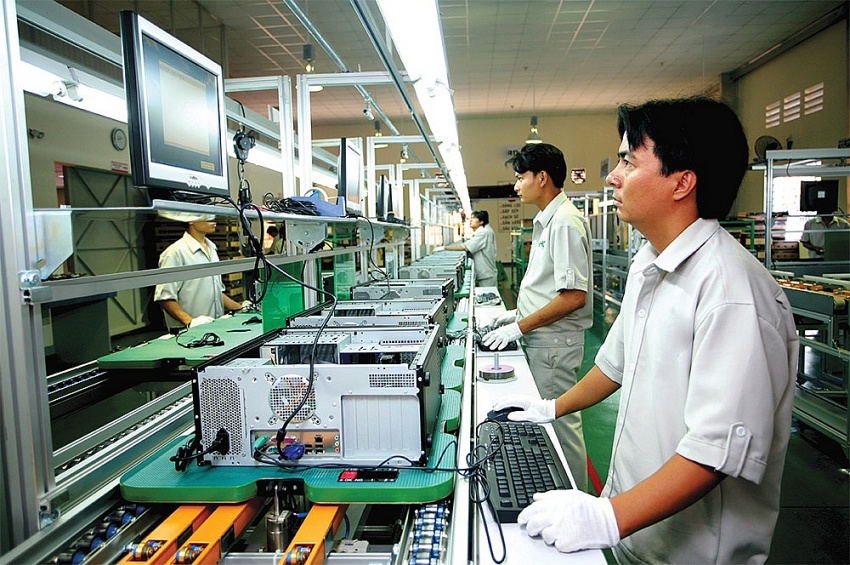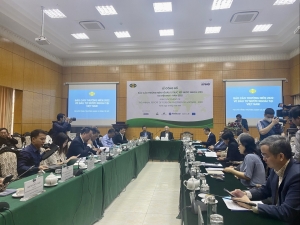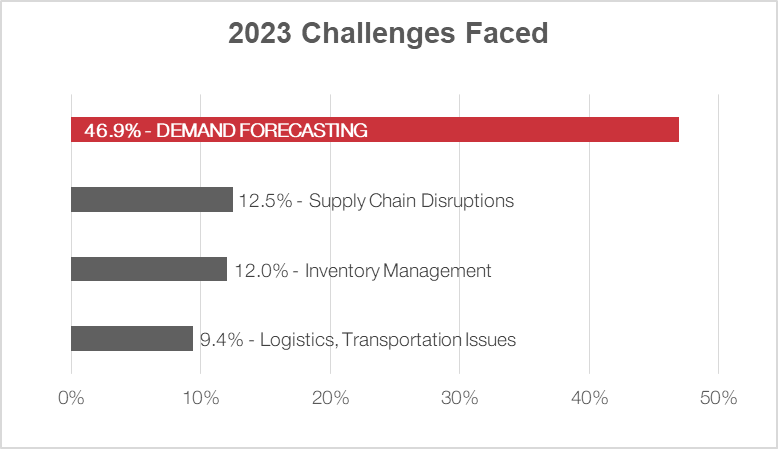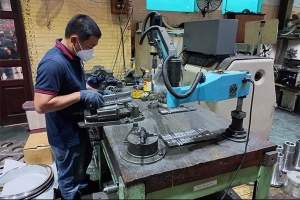Vendors seek global supply chain access
Hanoi Plastics JSC, a member of An Phat Holdings, and its South Korean partner PowerNet Technologies last week signed an MoU marking their strategic comprehensive partnership on electronic equipment assembly.
This event is deemed an important milestone, opening up prospects for cooperation and development for both sides and laying a stepping stone for Hanoi Plastics (HPC) to participate more deeply in the supply chain for leading South Korean businesses in the future.
 |
| Foreign groups look at capital, technology, manufacturing, and the market before making a decision, photo Le Toan |
PowerNet Technologies is currently a tier-1 supplier of Coway, a major brand in South Korea, with decades of experience in manufacturing and developing household appliances, notably air and water purifiers. Thus, this would be an important step for HPC to participate more deeply in the supply chain for Coway, while also ushering in opportunities for the company to become a leading supplier for businesses in South Korea and global electronics groups in the future.
Speaking at the signing ceremony, Pham Do Huy Cuong, CEO of An Phat Holdings and chairman of the Board of Directors of HPC, said, “The MoU marks a new success for HPC in its efforts to diversify the supply chain, realising the goal for production and business expansion, and product diversification to catch up with increasing market demands. This is also a solid stepping stone for us to engage more deeply in the global value chain, contributing to bringing high quality Vietnamese-made products to global customers.”
According to the Ministry of Planning and Investment (MPI), many enterprises from the likes of the US and South Korea have recently arrived in Vietnam to survey its semiconductor ecosystem.
“The potential is available. However, there is still a limited number of local companies capable of supplying products/technologies that meet the immediate demands of South Korean companies,” said Hong Sun, chairman of Korean Chamber of Commerce in Vietnam, at the Vietnam Business Forum (VBF) in Hanoi in March. “Additionally, there is insufficient information available about promising local companies. Especially in advanced industries such as semiconductors, electrical/electronics, and IT, the disparity is more pronounced.”
According to a Japan External Trade Organization (JETRO) report delivered at VBF 2024, the local content ratio of Japanese companies in Vietnam has only increased by 10 per cent over the past 10 years, which needs to be further accelerated. As of 2022, only 0.2 per cent of nearly one million domestic businesses joined the supply chain of supporting industries.
The localisation ratio for automobiles is between 5-20 per cent, the electronics sector at 5-10 per cent, and mechanical processing at 15-20 per cent. Meanwhile, the localisation ratio of the high-tech sector is 1-2 per cent only.
According to JETRO, businesses operating in Vietnam depend on imports for more than 60 per cent of production inputs, while supply chains have been disrupted for some time and transportation costs are still high.
Bui Van Thanh, director of New Sun Law Group, told VIR, “In general, the foreign partners often have extremely strict requirements about product delivery. At the contract, they often require domestic vendors to ensure that goods delivery is not interrupted in any situation, which means that Vietnamese vendors have to prepare a reserve of goods of within six months to a year.”
This requirement in particular is extremely hard for Vietnamese suppliers to get a slot in the partners’ supply chain because they have to suffer pressure to produce products with competitive prices and at the same time prepare financial sources to ensure a large number of reserved goods, added Thanh, who is a legal consultant for Taiwanese corporations in Vietnam such as Foxconn, Luxshare, and Pegatron.
The financial potential plays a crucial role when domestic vendors negotiate with foreign partners. However, said Luu Van Dai, director of metallurgy treatment group Metal Heat Vietnam, the problem is that the modest financial resources are one of the biggest disadvantages for domestic suppliers. Metal Heat Vietnam provides heat and surface treatment of metal products for domestic and foreign-invested partners nationwide.
“When foreign investors decide to invest in Vietnam, they will look at five factors: capital, technology, manufacturing progress, products, and the market. Thus, if domestic manufacturers can become vendors of these corporations, it is a precious opportunity to improve their competition capacity,” Dai said.
In August 2023, the Ministry of Industry and Trade proposed to the government policies to support enterprises operating in supplying parts and materials for garments and textiles, footwear, electronics, automobile production and assembly, and mechanical engineering. Approval of the proposals, which included an interest rate subsidy of 3 per cent, is not yet forthcoming.
 | Vietnam a 'star in global supply chain' Vietnam is a star in the global supply chain in terms of garments and textiles, footwear and electricity, according to a new report. |
 | Vietnam's supply chain leaders reflect on challenges In a survey conducted by CEL, a top supply chain consultancy firm, the sentiments of more than 300 business leaders and supply chain professionals in Vietnam shed some light on the current state of Vietnam's supply chain industry. |
 | SMEs face barriers to joining global supply chain Small- and medium-sized enterprises (SMEs) in the mechanical sectors face difficulties in joining the supply chain of large-scale manufacturers due to a lack of capital and incentive policies, according to Luu Van Dai, director of Metal Heat Vietnam JSC, speaking at the 2024 Vietnam Global Manufacturing Forum in Hanoi on March 26. |
What the stars mean:
★ Poor ★ ★ Promising ★★★ Good ★★★★ Very good ★★★★★ Exceptional
Related Contents
Latest News
More News
- SK Innovation-led consortium wins $2.3 billion LNG project in Nghe An (February 25, 2026 | 07:56)
- THACO opens $70 million manufacturing complex in Danang (February 25, 2026 | 07:54)
- Phu Quoc International Airport expansion approved to meet rising demand (February 24, 2026 | 10:00)
- Bac Giang International Logistics Centre faces land clearance barrier (February 24, 2026 | 08:00)
- Bright prospects abound in European investment (February 19, 2026 | 20:27)
- Internal strengths attest to commitment to progress (February 19, 2026 | 20:13)
- Vietnam, New Zealand seek level-up in ties (February 19, 2026 | 18:06)
- Untapped potential in relations with Indonesia (February 19, 2026 | 17:56)
- German strengths match Vietnamese aspirations (February 19, 2026 | 17:40)
- Kim Long Motor and AOJ Suzhou enter strategic partnership (February 16, 2026 | 13:27)

 Tag:
Tag:




















 Mobile Version
Mobile Version